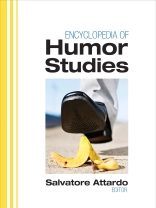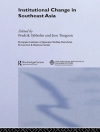The Encyclopedia of Humor Studies explores the concept of humor in history and modern society in the United States and internationally. This work’s scope encompasses the humor of children, adults, and even nonhuman primates throughout the ages, from crude jokes and simple slapstick to sophisticated word play and ironic parody and satire. As an academic social history, it includes the perspectives of a wide range of disciplines, including sociology, child development, social psychology, life style history, communication, and entertainment media. Readers will develop an understanding of the importance of humor as it has developed globally throughout history and appreciate its effects on child and adult development, especially in the areas of health, creativity, social development, and imagination. This two-volume set is available in both print and electronic formats.
Features & Benefits:
- The General Editor also serves as Editor-in-Chief of HUMOR: International Journal of Humor Research for The International Society for Humor Studies.
- The book’s 335 articles are organized in A-to-Z fashion in two volumes (approximately 1, 000 pages).
- This work is enhanced by an introduction by the General Editor, a Foreword, a list of the articles and contributors, and a Reader’s Guide that groups related entries thematically.
- A Chronology of Humor, a Resource Guide, and a detailed Index are included.
- Each entry concludes with References/Further Readings and cross references to related entries.
- The Index, Reader’s Guide themes, and cross references between and among related entries combine to provide robust search-and-browse features in the electronic version.
This two-volume, A-to-Z set provides a general, non-technical resource for students and researchers in such diverse fields as communication and media studies, sociology and anthropology, social and cognitive psychology, history, literature and linguistics, and popular culture and folklore.
Key Themes:
- Anthropology, Folklore, and Ethnicity
- Antiquity
- Components of Humor
- Culture
- Entertainment Industry
- History
- Literature and Major Literary Figures
- Performing Arts
- Philosophy and Religion
- Politics
- Psychology
- Clinical and Counseling Psychology
- Cognition
- Developmental Psychology
- General Psychology
- Health Psychology
- Interpersonal Relationships
- Motivation and Emotion
- Neuropsychology
- Personality and Social Psychology
- Tests and Measurement
- Professions
- Business World
- Education
- Law
- Humor Theory
- Linguistics
- Mathematics, Computer Science, and the Internet
- National, Ethnic, and Regional Humor
- Africa
- Americas
- Asia
- Europe
- Middle East
- Physiology and Biology
- Sociology
- Visual Humor
Daftar Isi
Foreword – William F. Fry, Jr.
Tentang Penulis
Salvatore Attardo was trained as a linguist at the Catholic University of Milan, Italy, where he graduated in foreign languages and literature (French), with a dissertation on the linguistics of humor, in 1986. In 1988, he moved to the United States to attend Purdue University. In 1991, together with Victor Raskin, Attardo published a long article that developed Raskin’s own semantic theory of humor into the general theory of verbal humor (GTVH). Later that year he received a Ph D in English from Purdue University, with a specialization in linguistics and a dissertation on the linguistics of humor, which was published in 1994 as his first book, Linguistic Theories of Humor. Attardo was professor of linguistics at Youngstown State University from 1992 to 2007. He coauthored, with Steven Brown, a sociolinguistics textbook, Understanding Language Structure, Interaction, and Variation (2000) and authored Humorous Texts (2001). He served as editor-in-chief of HUMOR: International Journal of Humor Research from 2001 to 2011. With Diana Elena Popa, he coedited the book New Approaches to the Linguistics of Humor (2007), and with Manuela Maria Wagner and Eduardo Urios-Aparisi, he coedited Prosody and Humor (2013). In 2007, he became chair of the Department of Literature and Languages at Texas A&M University–Commerce. In 2010, he became dean of the College of Humanities, Social Sciences, and Arts at Texas A&M University– Commerce, where he is also professor of linguistics. Attardo’s research is focused primarily on humor studies and pragmatics. He has published more than 100 articles and book reviews in scholarly journals. He serves on the editorial board of the Journal of Pragmatics and other journals. In the past decade, his interests have broadened to include the prosody and gestures accompanying humor, mainly working in collaboration with his wife, Lucy Pickering. In non-humor-related topics, Attardo has published in the fields of semantics, pragmatics, Italian studies, grammar, the pedagogy of linguistics, stylistics, cognitive linguistics, and computational linguistics.












